Both Serengeti and Viverral are originated from United States. Both Serengeti and Viverral are of same weight. Both Serengeti and Viverral has same life span. Both Serengeti and Viverral has same litter size. Both Serengeti and Viverral requires Low Maintenance.
Basic Information
undefined
United States
United States
Life Span:
12 - 15 Years
10 - 15 Years
Colors Available:
Tan and cream with silver or grey coloring as well as black spots and stripes
Cream, black, tan - spots
Coat:
Short and silky
Short and plush
Temperament:
Affectionate, Aggressive, Alert, Cheerful, Curious, Energetic, Friendly, Independent, Intelligent, Lively, Loving, Loyal, Outgoing, Playful, Responsive, Social, Territorial
Affectionate, Aggressive, Alert, Cheerful, Curious, Energetic, Friendly, Independent, Intelligent, Lively, Loving, Loyal, Outgoing, Playful, Responsive, Social, Stubborn, Territorial
Grooming:
Low Maintenance
Low Maintenance
New Owners Friendly:
Yes
Yes
History
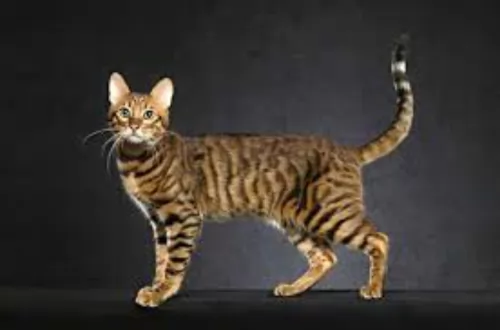 This is a cat breed that was deliberately bred to resemble the Serval cat. It was developed by crossing a Bengal cat and an Oriental Shorthair.
This is a cat breed that was deliberately bred to resemble the Serval cat. It was developed by crossing a Bengal cat and an Oriental Shorthair.
The cat was developed by biologist Karen Sausman in California in 1994. The breed is still under development.
The idea with this hybrid cat was to produce new domestic cat breed that would look like a wild cat but not have the wild characteristics.
The cat is recognized by TICA – The International Cat Association.
This is a rare cat breed and therefore not much information on it is available.
It does seem that in 2002, a 5th generation Viverral was developed and this established the breed.
The cat is described as a fishing cat hybrid. A breeding program was started but it is thought that the cat became extinct.
Description
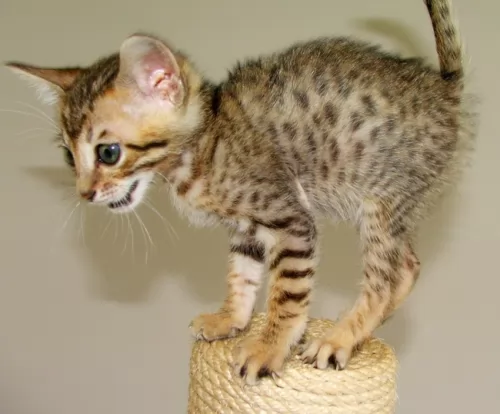 These are spotted cats with long legs and large, round-tipped ears. The neck is long and the body lithe, lean, and muscular.
These are spotted cats with long legs and large, round-tipped ears. The neck is long and the body lithe, lean, and muscular.
They are medium to large in size and can weigh up to 7 or 8kg. The coat is tan and cream with silver or grey coloring as well as black spots and stripes. Some Serengetis appear to be black but on closer look, you see that they have what is known as ‘ghost spotting’ – a black-spotted pattern that can scarcely be seen.
You may even think you are looking at a black panther. The coat is short, silky, smooth, and sleek. The eyes of the cat are round and are usually amber or gold.
Temperament:
The Serengeti is a friendly, social, and confident cat that is quite capable of forming a strong attachment to its human family. It is a loving, loyal cat. The cat can become bored and will need plenty of puzzle toys to keep his mind and body physically active.
You will need to provide him with a scratching post too as he is a lively, energetic cat. This isn’t only an indoor cat. Cats like the Serengeti will need an outdoor enclosure and the Serengeti cat will need branches and perches to leap up onto.
He is an active cat and can become bored if left indoors. They are capable of making a good family pet and are vocal too – telling you all sorts of things.
The Viverral is muscular and substantial. He has a smallish head and smallish ears with a thick tail.
The coat is spotted. The base color of the coat and the spots should be different. The light cream underbelly is also spotted.
Large, muscular, and solid, the cat’s eyes are big and round in the smallish heald. The coat is short and plush with a spotted pattern of black, brown or tan spots.
Temperament:
The Viverral cat has been designed to produce friendly kittens that are curious and confident. They turn out strong and confident and are suitable as house cats.
New cat owners might have success with them and they can even be friendly with children in the home, but the truth remains, they are unpredictable.
Beautiful and something unique, it is not likely though that this cat breed would have wanted to be cuddled and petted by his human owners.
Characteristics
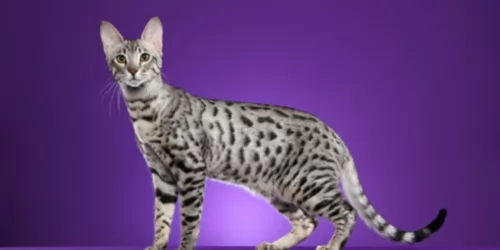 The Serengeti is both a friendly and affectionate cat even though he is a bit shy and overwhelmed in new surroundings.
The Serengeti is both a friendly and affectionate cat even though he is a bit shy and overwhelmed in new surroundings.
He is a cat that talks quite a bit and if he is happy and content he enjoys 'chatting' to you about his day.
He is able to get on well with children in the home as well as with other pets. He is an athletic cat and just loves to climb, and this is why he will certainly need an outdoor enclosure as he loves to dart around madly from time to time, and doing that in your home could be quite dangerous.
He is capable of being a loving cat breed and can form a strong bond with his human family.
Hybrid cats such as the Viverral can look quite a bit like a wild cat and this is what first appeals to cat lovers. They want an exotic cat to brag about.
However, these cats can come up with a whole lot of behavioral problems so that you wish you had never got one. One should just go along to some of the many cat shelters there are to discover how many hybrid cats land up there.
They turned out to be a disappointment – their behavior wouldn’t conform to what their human family expected of them. This is the story of hybrid cats. Humans want some exotic looking animal to please their greedy natures and then when the cats don’t behave the way they should, they get rid of them. Rather, it is humans that need to change their behavior and leave wild animals alone.
The Viverral can have their good side and be splendid pets but they aren’t consistent. They have a streak of unpredictability, and they also have issues with the use of a litter box.
They mark their territory too and can show some aggression. Any animal with a wild side isn’t going to make the best pet, but still, some cat lovers have managed to bring out their best side.
Health Problems
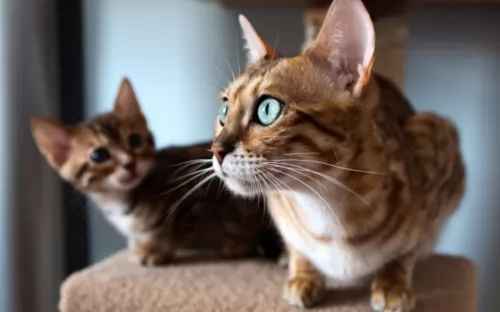 Hybrid Cats such as the Serengeti are a combination of a wild breed and a domestic breed. With good care he can live to be up to 15 years of age and possibly longer.
Hybrid Cats such as the Serengeti are a combination of a wild breed and a domestic breed. With good care he can live to be up to 15 years of age and possibly longer.
Hybrid cats are always controversial because people who have owned them have got both good and bad to say about them. They have some behavioral issues and many of them have an aggressive side, they’re aloof and they refuse to use a litter box. The cat can’t be blamed though because they have that wild side.
They also come with some health issues such as premature birth, miscarriage, diarrhea, and irritable bowel disease. You may just find yourself more often at the vet than you’d like.
You will need to ensure that your Serengeti gets all his vaccines and de-worming treatments.
The development of hybrid cats began as a scientific effort in the 1970s. Hybrid pets can be aggressive and also solitary.
Hybrid cats are an unnatural breeding. They are cat species that weren’t meant to mate in the first place. Breeders tell stories of premature births and also aborted pregnancies.
Some of the more common illnesses among hybrid cats include digestive issues. Also, vaccinations used to protect our domestic cats from disease have not been approved for use in hybrid animals.
A hybrid cat has a wild side to him. These cats were bred to look like a wild cat, and although they are healthy, they can also have some health issues.
Ensuring the cat has a proper diet will contribute more to better health. As mentioned, some of these cats can battle with the likes of chronic diarrhea and irritable bowel disease and also battle with intestinal parasite issues.
Caring The Pet
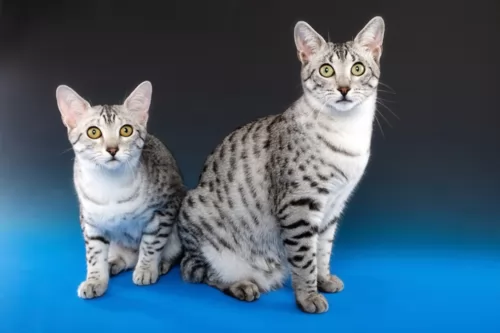 Grooming is easy for the Serengeti as it is a short-haired cat and will require a brush just once a week. Trimming the claws will also be necessary.
Grooming is easy for the Serengeti as it is a short-haired cat and will require a brush just once a week. Trimming the claws will also be necessary.
A cat such as the Serengeti has been developed by crossing the domestic cat with a wild breed. This means that there will be concerns with the temperament and behavior of these cats in a home setting. Apart from being allowed indoors, they will need an outside enclosure.
Having a wild side, while every cat is a carnivore, these cats are even more so. Their diet has to be strictly protein – meat. Wild cats would have a diet made up of birds and lizards. You want to avoid commercial cat foods that are of lower quality and have less meat in and more carbohydrates. This just spells ill health for your cat. Cats also need some fresh raw meat in their diets.
It is important to keep up your Serengeti's veterinary checkups to make sure there aren’t any health concerns.
These are different cats to your regular domestic cat, and they will require different care. One of the things you need to do for a cat like this is provide it with an outdoor enclosure.
Because of their wild side, they are longing to be outdoors and you may find it difficult integrating such a cat into your home.
The Viverral needs plenty of exercise but you can’t just let them roam freely outdoors. Yes, you can train them to walk with a leash but you need to allow him outside in the enclosure. You can include a shallow paddling pool for him too.
These are active, intelligent cats and you will need to invest in some interactive toys for him to keep him amused.
You will need to supply this cat with a scratching post and a climbing tree. This is because as a cat, he is a natural climber and scratcher and he will need these in his life.
Ensure your feline pet has a nice warm, dry place to sleep.
Comparison with other breeds
- Serengeti vs Abyssinian - Breed Comparison
- Serengeti vs Aegean - Breed Comparison
- Serengeti vs African Serval - Breed Comparison
- Serengeti vs Chausie - Breed Comparison
- Serengeti vs American Bobtail - Breed Comparison
- Serengeti vs American Curl - Breed Comparison
- Serengeti vs American Keuda - Breed Comparison
- Serengeti vs American Longhair - Breed Comparison
- Serengeti vs American Polydactyl - Breed Comparison
- Serengeti vs American Shorthair - Breed Comparison
- Serengeti vs American Wirehair - Breed Comparison
- Serengeti vs Applehead Siamese - Breed Comparison
- Serengeti vs Ashera - Breed Comparison
- Serengeti vs Asian - Breed Comparison
- Serengeti vs Asian Semi-Longhair - Breed Comparison
- Serengeti vs Australian Mist - Breed Comparison
- Serengeti vs Balinese - Breed Comparison
- Serengeti vs Bengal - Breed Comparison
- Serengeti vs Bicolor - Breed Comparison
- Serengeti vs Birman - Breed Comparison
- Serengeti vs Blue Russian - Breed Comparison
- Serengeti vs Bombay - Breed Comparison
- Serengeti vs Brazilian Shorthair - Breed Comparison
- Serengeti vs Bristol - Breed Comparison
- Serengeti vs British Longhair - Breed Comparison
- Viverral vs Abyssinian - Breed Comparison
- Viverral vs Aegean - Breed Comparison
- Viverral vs African Serval - Breed Comparison
- Viverral vs Chausie - Breed Comparison
- Viverral vs American Bobtail - Breed Comparison
- Viverral vs American Curl - Breed Comparison
- Viverral vs American Keuda - Breed Comparison
- Viverral vs American Longhair - Breed Comparison
- Viverral vs American Polydactyl - Breed Comparison
- Viverral vs American Shorthair - Breed Comparison
- Viverral vs American Wirehair - Breed Comparison
- Viverral vs Applehead Siamese - Breed Comparison
- Viverral vs Ashera - Breed Comparison
- Viverral vs Asian - Breed Comparison
- Viverral vs Asian Semi-Longhair - Breed Comparison
- Viverral vs Australian Mist - Breed Comparison
- Viverral vs Balinese - Breed Comparison
- Viverral vs Bengal - Breed Comparison
- Viverral vs Bicolor - Breed Comparison
- Viverral vs Birman - Breed Comparison
- Viverral vs Blue Russian - Breed Comparison
- Viverral vs Bombay - Breed Comparison
- Viverral vs Brazilian Shorthair - Breed Comparison
- Viverral vs Bristol - Breed Comparison
- Viverral vs British Longhair - Breed Comparison
 Petzlover
Petzlover This is a cat breed that was deliberately bred to resemble the Serval cat. It was developed by crossing a Bengal cat and an Oriental Shorthair.
This is a cat breed that was deliberately bred to resemble the Serval cat. It was developed by crossing a Bengal cat and an Oriental Shorthair. These are spotted cats with long legs and large, round-tipped ears. The neck is long and the body lithe, lean, and muscular.
These are spotted cats with long legs and large, round-tipped ears. The neck is long and the body lithe, lean, and muscular. The Serengeti is both a friendly and affectionate cat even though he is a bit shy and overwhelmed in new surroundings.
The Serengeti is both a friendly and affectionate cat even though he is a bit shy and overwhelmed in new surroundings. Hybrid Cats such as the Serengeti are a combination of a wild breed and a domestic breed. With good care he can live to be up to 15 years of age and possibly longer.
Hybrid Cats such as the Serengeti are a combination of a wild breed and a domestic breed. With good care he can live to be up to 15 years of age and possibly longer. Grooming is easy for the Serengeti as it is a short-haired cat and will require a brush just once a week. Trimming the claws will also be necessary.
Grooming is easy for the Serengeti as it is a short-haired cat and will require a brush just once a week. Trimming the claws will also be necessary.